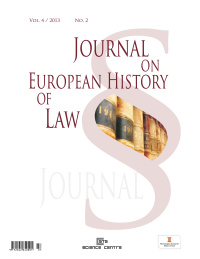The Nation State and the Law: A Legal Critique of the Organic Development and Restrictions of the Legal Powers of the State
The Nation State and the Law: A Legal Critique of the Organic Development and Restrictions of the Legal Powers of the State
Author(s): Zia AkhtarSubject(s): Law, Constitution, Jurisprudence
Published by: Evropská společnost pro právní dějiny, z.s.
Keywords: National identity; Volk; Westphalia; liberalism; universal jurisdiction.
Summary/Abstract: Has the concept of the nation state reached its apotheosis after the success of liberalism on the political spectrum? This question needs to be answered by evaluating the Constitution as the rule making authority that is embodied in the sovereign state. The nation emerged from the various strands of nationalism and there was a development into a Westphalian state that exercised territorial integrity and full sovereignty. It went through various expressions of its evolution including Hegelian’s definition of the abstract framework of the state based on the relations of power. However, there is a distinction between the nation- state and the nation and the former is a more durable concept. Philip Roeder argues that it follow a symmetry which is based on a segmented growth pattern and is premised on the state ‘s progressive development of institutions. In Europe the nation state are ancient constructs that emerged with the development of the national consciousness that enabled the nation state to be recognsied as a member state of the United Nations. The framing of treaties of setting out principles of international law has allowed some states to practice universal jurisdiction. It has been restricted because of the subjective nature of the legal political framework of the state. The approach that Kelsen takes is to confer monism and dualism as part of the theory that the state and the international order are both regulated by the basic norm. This article traces the framework or ‘glue’ that holds the nation state together. It arrives at the conclusion that the ideological state has come to an end and that liberalism has triumphed in the global consensus of modern nation states.
Journal: Journal on European History of Law
- Issue Year: 4/2013
- Issue No: 2
- Page Range: 97-106
- Page Count: 11
- Language: English

